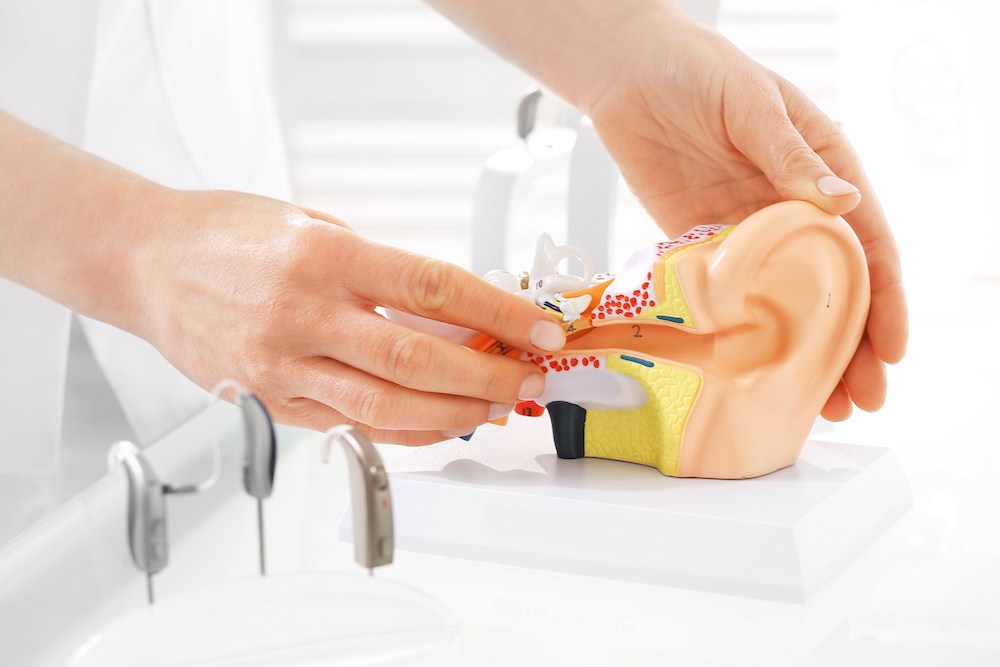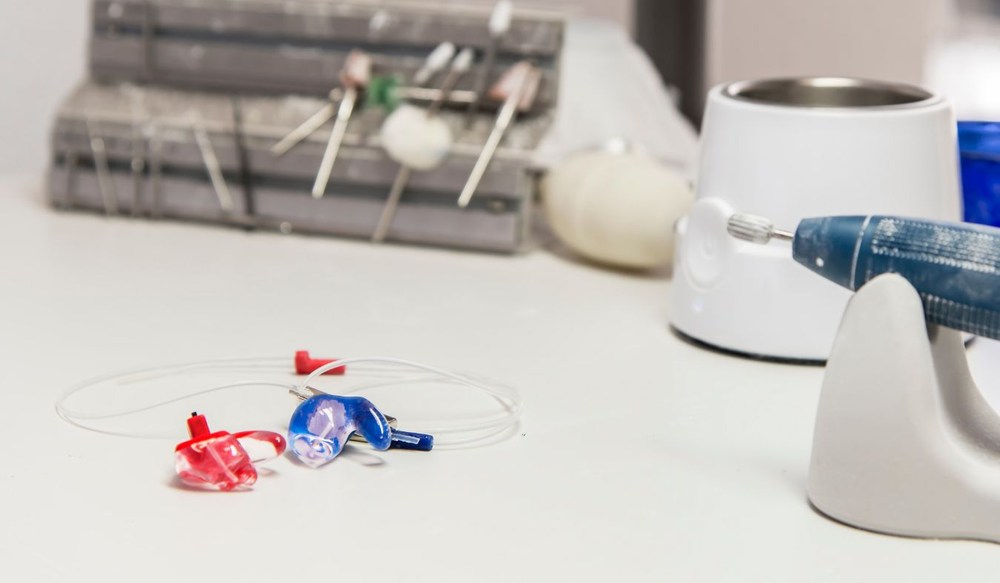Protecting Your Hearing During Summer Sports
Summer brings a lot more noise into your life than you might realize.
Walk In Cleaning Clinic: Come in on Mondays, Wednesdays, Thursdays, or Fridays anytime between 1 – 2pm for our walk in cleaning clinic!

As the winter air rolls in, bringing colder temperatures and drier air, you might notice a ringing in your ears – a symptom often referred to as tinnitus. This ringing can be quite bothersome, causing discomfort and even disrupting your daily routine. Several factors can influence this issue, including exposure to cold and dry air, which is common during the cooler months. Spending time outdoors during this time of the year may involve activities like ice skating, sledding or attending winter festivals, all of which can potentially expose individuals to cold, windy conditions that may aggravate tinnitus. Additionally, indoor heating systems prevalent during the colder months can contribute to the dryness of the air, potentially worsening tinnitus.
Understanding how these environmental conditions might affect tinnitus and what steps you can take to help you better cope with these seasonal changes, ensures your comfort and peace of mind.
Tinnitus, the persistent ringing in your ears, can be influenced by various triggers. It’s a widespread issue, with around 50 million Americans experiencing some form of tinnitus.
Common triggers often include exposure to loud noise and certain medications. However, factors such as stress and even changes in weather can also play a significant role. It’s important to understand these triggers to manage tinnitus effectively with the help of your hearing health professional.
As seasons change, so can the intensity of your tinnitus. The shift in weather, particularly from a warmer to a colder season, often brings with it drier air. This dryness can potentially cause your ears to produce more earwax, leading to blockages that may exacerbate tinnitus symptoms.
Here’s how weather shifts might impact your hearing health:
As winter approaches, you might wonder why cold air seems to intensify the ringing in your ears. It’s not just your imagination; there’s a connection between cold weather and tinnitus. The cold can constrict blood vessels, reducing circulation to your ears, which may heighten tinnitus symptoms.
So what can you do? First off, don’t ignore the changes – get in touch with a hearing specialist. They can provide personalized strategies for managing increased tinnitus symptoms during winter. This might include adjusting your hearing aids if you use them or suggesting other helpful tactics like using a humidifier at home to combat dry air. Understanding how cold air affects your tinnitus is the first step towards managing it effectively.
As we’ve established, winter’s dry air can have a significant impact on your tinnitus. But why is this? Simply put, dry air can lead to dehydration. When your body is dehydrated, it has a harder time producing enough earwax. This lack of lubrication in your ears can lead to irritation and potentially exacerbate the ringing sound associated with tinnitus.
Additionally, dry air also affects the mucus lining in your nasal passages and throat. This can lead to swelling and congestion which may indirectly worsen your tinnitus symptoms. While these factors might make your tinnitus more noticeable, they don’t necessarily mean that the issue itself has worsened.
So how do you combat the effects of dry air on tinnitus? One effective strategy could be using a humidifier at home during colder months to maintain moisture in the air. Keeping yourself well-hydrated by drinking plenty of water can also help alleviate symptoms. If you’re noticing an increase in tinnitus symptoms during winter months, it’s always best to consult with a hearing specialist who can provide tailored advice for managing these changes effectively.
When winter’s chill begins to bite and the air grows dry, it’s not uncommon for your tinnitus symptoms to become more noticeable. This is where hearing specialists come in, offering expert advice and personalized strategies to help you manage these seasonal changes in your tinnitus symptoms effectively.
• Why does my tinnitus seem worse in winter?
• How can a hearing specialist help manage my tinnitus during colder months?
• What are some strategies I can use at home to alleviate tinnitus symptoms during winter?
As the seasons shift, it’s important to stay ahead of the curve in managing your hearing health. A proactive approach can make a significant difference in how you experience tinnitus during these changes. Regular check-ups with your hearing specialist are key, allowing for personalized advice and strategies tailored to your needs. Additionally, maintaining a well-hydrated environment at home using a humidifier and drinking plenty of water can help combat the effects of dry air on your tinnitus symptoms. Taking control of your hearing health amid seasonal changes is not just possible, but entirely within your reach!
When it comes to addressing tinnitus, a visit to a hearing instrument specialist is a crucial step in finding relief. The testing process typically begins with a comprehensive evaluation of your hearing health, which may include various assessments to determine the extent and nature of your tinnitus symptoms. During this evaluation, the specialist will gather information about your current symptoms and any factors that may be contributing to your tinnitus, such as exposure to loud noise or underlying medical conditions.
Once the testing is complete and a diagnosis of tinnitus is confirmed, the hearing instrument specialist can discuss various treatment options and management strategies tailored to your specific needs. These options may include sound therapy, which aims to provide relief from tinnitus by masking the perceived ringing or buzzing with soothing sounds like white noise or nature sounds. Hearing aids equipped with tinnitus masking features can help alleviate the symptoms of tinnitus by providing soothing background sounds that distract from the ringing or buzzing sensation. Additionally, counseling sessions may be offered to help you better understand your tinnitus and learn coping mechanisms to reduce its impact on your daily life.
During your appointment, the hearing instrument specialist can also provide guidance on lifestyle modifications that may help alleviate tinnitus symptoms. This could involve recommendations for protecting your ears from loud noises, managing stress levels, improving sleep hygiene and incorporating relaxation techniques into your daily routine. By addressing both the physical and emotional aspects of tinnitus, the specialist aims to empower you to take control of your condition and improve your overall quality of life.
Overall, the appointment with a hearing instrument specialist serves as a crucial opportunity to discuss your tinnitus symptoms openly and collaboratively explore effective treatment options. With their expertise and support, you can gain valuable insights into managing your tinnitus and find relief from its disruptive effects on your daily life.
Hearing aids play a crucial role in managing tinnitus by providing relief through various mechanisms. One approach involves using hearing aids to amplify external sounds, which can help mask or drown out the ringing or buzzing sensation associated with tinnitus. This amplification can be customized to match an individual’s hearing needs and preferences, with different styles like behind the ear (BTE), in the ear (ITE) or completely in canal (CIC) options available to accommodate different levels of hearing loss and aesthetic preferences.
In addition to amplification, many modern hearing aids come equipped with specialized masking features designed specifically for tinnitus management. These features generate soothing background sounds, such as white noise, ocean waves or gentle music, to help distract the brain from the perception of tinnitus. By incorporating these masking sounds into the wearer’s auditory environment, hearing aids can provide relief from the intrusive nature of tinnitus, allowing individuals to better focus on their daily activities and enjoy improved overall quality of life.
Hearing aids with built-in tinnitus therapy programs offer additional benefits beyond simple sound masking. These programs often include customizable sound therapy options that allow users to adjust the frequency, volume and type of masking sounds to suit their individual needs. Additionally, some hearing aids offer integrated smartphone apps or remote controls, giving users greater control over their tinnitus treatment and allowing them to tailor their therapy in real-time based on their changing environments and preferences.
Winter’s chill and dry air can indeed intensify the ringing in your ears known as tinnitus. However, with a proactive approach and the guidance of hearing specialists, you can confidently cope with these seasonal changes. From understanding how cold weather affects your tinnitus to adopting practical measures like using a humidifier or staying hydrated, every step counts towards managing your symptoms effectively.
If you’ve noticed an increase in tinnitus symptoms during winter months or simply wish to learn more about managing this issue amid seasonal changes, we’re here for you at Better Hearing Oneida. Our team of dedicated hearing health professionals is ready to provide personalized advice tailored to your needs.
For more information or to schedule an appointment at our Oneida, NY location, please call us at (315) 693-3637. We’re committed to helping you maintain optimal hearing health through every season because we believe that your comfort and well-being are worth it! Don’t let winter’s chill dictate your comfort – get in touch today!

Summer brings a lot more noise into your life than you might realize.

When you’re choosing hearing aids, you want devices that help you

Your hearing aids are more than just devices – they’re your